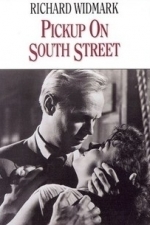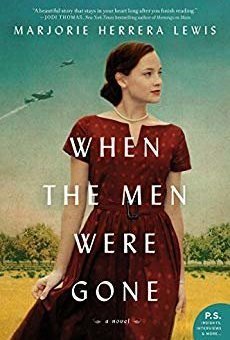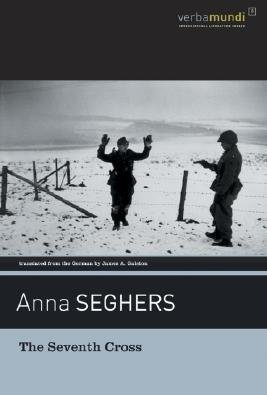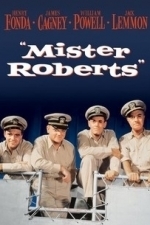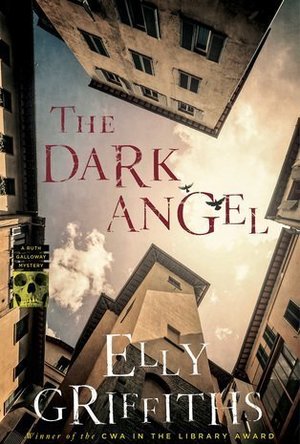Search
Search results
SL
Sous Les Ordres de Rommel: Des Deserts D'Afrique Du Nord Aux Plages de Normandie
Hans Holler and Markus Reisner
Book
In this extraordinary autobiography by Hans Holler, an Austrian born in 1921 near Wiener Neustadt,...
Richard Hell recommended Pickup on South Street (1953) in Movies (curated)

Interstate: Express Highway Politics, 1939-2009
Book
This new, expanded edition brings the story of the Interstates into the twenty-first century. It...
Heather Cranmer (2721 KP) rated When the Men Were Gone in Books
May 20, 2019
There was something about the synopsis of When the Men Were Gone by Marjorie Herrera Lewis that really reeled me in. Perhaps it's because this story takes place in Brownwood, Texas which is a place I've visited and loved. Perhaps it was because it was based on a true story and about a woman rising up to a challenge to take on a man's role back in the day when things like that were unheard of. Either way, I must say that I really enjoyed this book.
Tylene Wilson loves football. In fact, football is all she's ever really known since she was a very little girl thanks to her father. When both male football coaches for the high school she works at go off to war in the Autumn of 1944, she desperately tries to find another male coach to take the job. If she doesn't, the Brownwood Lions football season will be over before it even began, and all the senior boys will more than likely end up enlisted fighting in World War II. After struggling to find a suitable coach, Tylene decides to coach the football team herself. When word gets out that a woman will be coaching a football team, people in and around Brownwood let it be known that they are very opposed to the idea. Even Tylene's close friends snub their nose at the idea. People try to get the Brownood Lions' football season cancelled, but Tylene will not let that happen if she can help it. Will Tylene be able to convince everyone that a woman can coach football just as good as a man?
I found the plot for When the Men Were Gone to be solid. As I've stated previously, this book is based on a true story. I had never heard of Tylene Wilson until I read Marjorie Herrera Lewis' book. I found it extremely interesting to have a glimpse into what Tylene Wilson may have had to go through. Lewis does a fantastic job at imagining what Tylene's life was like and what life in the small town of Brownwood would have been like around 1944. I could not find any fault with the story telling. In fact, I felt like I was transported into the book and was amidst all the action watching the story unfold. I will admit that I did not understand most of the football jargon though, but that didn't really take too much away from the story. As with most historical fiction novels, there were no major plot twists, but all my questions were answered. There was not cliffhanger ending.
I enjoyed the character of Tylene. Lewis did an amazing job at making me feel as if I knew Tylene. At times, I felt like I was Tylene. I could feel how stressed she was at times and how much her students and football meant to her. Tylene was such a strong female character. I just loved her and her determination! Moose was another character I loved. I admired his loyalty even though he was aware of the backlash. Jimmy was another interesting character to read about. I was intrigued to read about his struggles to play football for a "lady coach." On one hand, he admired Tylene and knew that she knew her stuff when it came to football. On the other hand, he was still a teenage boy open to peer pressure living in a time when woman were doing the traditional roles.
The pacing for When the Men Were Gone starts out a bit slow. There were a bunch of character names thrown out in the first few chapters which left me feeling confused about who was who. However, I quickly caught on, and the pacing picked up decently.
Trigger warnings for When the Men Were Gone include sexism, bigotry, misogyny, drunkenness, and some war violence.
All in all, When the Men Were Gone is a short read that packs a huge punch! Based on a true story, this novel has a fantastically strong female lead and plenty of drama that will definitely keep its reader hooked. I would definitely recommend When the Men Were Gone by Marjorie Herrera Lewis to those aged 15+ who enjoy football and love a story with a very strong female lead. I would give this book a 4 out of 5.
--
(Thanks to the Marjorie Herrera Lewis for providing me with a paperback of When the Men Were Gone in exchange for an honest and unbiased review.)
Tylene Wilson loves football. In fact, football is all she's ever really known since she was a very little girl thanks to her father. When both male football coaches for the high school she works at go off to war in the Autumn of 1944, she desperately tries to find another male coach to take the job. If she doesn't, the Brownwood Lions football season will be over before it even began, and all the senior boys will more than likely end up enlisted fighting in World War II. After struggling to find a suitable coach, Tylene decides to coach the football team herself. When word gets out that a woman will be coaching a football team, people in and around Brownwood let it be known that they are very opposed to the idea. Even Tylene's close friends snub their nose at the idea. People try to get the Brownood Lions' football season cancelled, but Tylene will not let that happen if she can help it. Will Tylene be able to convince everyone that a woman can coach football just as good as a man?
I found the plot for When the Men Were Gone to be solid. As I've stated previously, this book is based on a true story. I had never heard of Tylene Wilson until I read Marjorie Herrera Lewis' book. I found it extremely interesting to have a glimpse into what Tylene Wilson may have had to go through. Lewis does a fantastic job at imagining what Tylene's life was like and what life in the small town of Brownwood would have been like around 1944. I could not find any fault with the story telling. In fact, I felt like I was transported into the book and was amidst all the action watching the story unfold. I will admit that I did not understand most of the football jargon though, but that didn't really take too much away from the story. As with most historical fiction novels, there were no major plot twists, but all my questions were answered. There was not cliffhanger ending.
I enjoyed the character of Tylene. Lewis did an amazing job at making me feel as if I knew Tylene. At times, I felt like I was Tylene. I could feel how stressed she was at times and how much her students and football meant to her. Tylene was such a strong female character. I just loved her and her determination! Moose was another character I loved. I admired his loyalty even though he was aware of the backlash. Jimmy was another interesting character to read about. I was intrigued to read about his struggles to play football for a "lady coach." On one hand, he admired Tylene and knew that she knew her stuff when it came to football. On the other hand, he was still a teenage boy open to peer pressure living in a time when woman were doing the traditional roles.
The pacing for When the Men Were Gone starts out a bit slow. There were a bunch of character names thrown out in the first few chapters which left me feeling confused about who was who. However, I quickly caught on, and the pacing picked up decently.
Trigger warnings for When the Men Were Gone include sexism, bigotry, misogyny, drunkenness, and some war violence.
All in all, When the Men Were Gone is a short read that packs a huge punch! Based on a true story, this novel has a fantastically strong female lead and plenty of drama that will definitely keep its reader hooked. I would definitely recommend When the Men Were Gone by Marjorie Herrera Lewis to those aged 15+ who enjoy football and love a story with a very strong female lead. I would give this book a 4 out of 5.
--
(Thanks to the Marjorie Herrera Lewis for providing me with a paperback of When the Men Were Gone in exchange for an honest and unbiased review.)
Rachel King (13 KP) rated The Sandalwood Tree in Books
Feb 11, 2019
he book is like a story within a story. The book begins with the framing story of a woman, Evie, in 1947, who accompanies her husband and young son to India with the dual purpose of seeking adventure and hoping to mend her failing marriage with a man just returned from World War II, broken. When she discovers a bundle of 90-year-old letters hidden in the wall during a cleaning frenzy, the second story of the friendship between Felicity and Adela is revealed. From there, Evie's story diverges from that of Felicity and Adela's as Evie struggles to find more evidence of the two other women's existence and uses her fascination as a distraction from the political turmoil occurring around her.
The British are pulling out of India and separating the religious factions of Muslims and Hindus into the two countries of India and Pakistan, causing chaos and mayhem all over the country of India. The imagery and descriptions that Newmark fills the pages with are mesmerizing in their intensity and splendor. The colors, smells, and sounds have me half-falling in love with India to the point that I search for images online to match what I am reading to get a clearer picture of what the characters experience. Even though I struggled to stay interested in the plot for the first third of the book, the descriptions kept me reading and reading.
Felicity and Adela's story begins from childhood, describing how Felicity was born in India, but fostered with Adela's family. The infamous husband hunt brought them both back to India through different means, though neither had any interest in a husband, for different scandalous reasons. Residing in the same home that Evie now occupies, Felicity and Adela shun the conventional life of an Englishwoman in India, instead adopting an independent lifestyle and embracing India in all its diverse beauty.
Evie herself also seeks to shun what is expected of her, desiring to fully experience the culture of India all around her and use it to heal the problems in her own life. Eventually, she reconnects with the story of the two other women, even as major obstacles present themselves in both her private life and in the immediate villages. Letters take over the narration of Felicity and Adela's tale as Evie finds more to continue the story, instead of the author simply narrating what Evie can't find.
On the whole, the novel was beautifully written and contained a worthwhile plot, though I struggled to stay interested at the beginning. I would recommend this book to anyone who enjoys a mystery and craves the beauty of India.
The British are pulling out of India and separating the religious factions of Muslims and Hindus into the two countries of India and Pakistan, causing chaos and mayhem all over the country of India. The imagery and descriptions that Newmark fills the pages with are mesmerizing in their intensity and splendor. The colors, smells, and sounds have me half-falling in love with India to the point that I search for images online to match what I am reading to get a clearer picture of what the characters experience. Even though I struggled to stay interested in the plot for the first third of the book, the descriptions kept me reading and reading.
Felicity and Adela's story begins from childhood, describing how Felicity was born in India, but fostered with Adela's family. The infamous husband hunt brought them both back to India through different means, though neither had any interest in a husband, for different scandalous reasons. Residing in the same home that Evie now occupies, Felicity and Adela shun the conventional life of an Englishwoman in India, instead adopting an independent lifestyle and embracing India in all its diverse beauty.
Evie herself also seeks to shun what is expected of her, desiring to fully experience the culture of India all around her and use it to heal the problems in her own life. Eventually, she reconnects with the story of the two other women, even as major obstacles present themselves in both her private life and in the immediate villages. Letters take over the narration of Felicity and Adela's tale as Evie finds more to continue the story, instead of the author simply narrating what Evie can't find.
On the whole, the novel was beautifully written and contained a worthwhile plot, though I struggled to stay interested at the beginning. I would recommend this book to anyone who enjoys a mystery and craves the beauty of India.
ClareR (6062 KP) rated The Seventh Cross in Books
Aug 22, 2018
This remains a lesson for us all
I was keen to read this translation, as I had originally read it during my German degree, in German. In fact, this book was a central part of my dissertation and was one of three Anna Seghers novels. They were all set in the National Socialist period of 1933-1945 (or thereabouts). I remember the German version being a very dense, challenging book - but that’s not necessarily a bad thing for me! I like a book that makes me think, and there’s plenty of food for thought here.
This story is jam packed with characters from all sides of the German story: National Socialists, Communists, the SS and the ordinary working German,
Georg Heisler (I’m using the German derivative of his name; I have no idea why his name was anglicised to ‘George’ whilst other characters kept their German names) escapes from a fictitious concentration camp (Westhofen) along with six other men. This is pre World War II, this is what the National Socialists did to their own countrymen and any dissent.
The story follows the recapture of the other six, Georg’s escape and all those who help him. Persecution on this scale is still happening today, and whether or not it is happening, we should still read about it and remember, in order to ensure that it doesn’t happen again.
I’ve touched on the language and style. It’s not easy. It wasn’t easy to read and understand in German, and it can be hard going in English. It seems quite detached from emotion, and I think this is a deliberate device. If we look at the historical context, people clearly disengaged froma large part of what was happening around them. One of the SS soldiers refers to “Sarah’s”; the men in the concentration camp are there being starved and tortured due to their political ideology, and people live within hearing distance, hear the shouting, crying and the pain of the prisoners and do nothing: an embarrassed shrug, a closing of their ears.
This is the part that we should never forget: inaction, and the necessity to stop these things in their tracks at the beginning, rather than before it’s too late.
Georg has his helpers, those who risk their lives to save his (just as Seghers and her husband, both communist Jews had their helpers). The startling thing to me about this novel, is the normalcy: the countryside stays the same, the relationships, work. All seemed normal in the face of such evil. This is a novel to remember and learn from. It has as many lessons for us today as it did seventy years ago,
This story is jam packed with characters from all sides of the German story: National Socialists, Communists, the SS and the ordinary working German,
Georg Heisler (I’m using the German derivative of his name; I have no idea why his name was anglicised to ‘George’ whilst other characters kept their German names) escapes from a fictitious concentration camp (Westhofen) along with six other men. This is pre World War II, this is what the National Socialists did to their own countrymen and any dissent.
The story follows the recapture of the other six, Georg’s escape and all those who help him. Persecution on this scale is still happening today, and whether or not it is happening, we should still read about it and remember, in order to ensure that it doesn’t happen again.
I’ve touched on the language and style. It’s not easy. It wasn’t easy to read and understand in German, and it can be hard going in English. It seems quite detached from emotion, and I think this is a deliberate device. If we look at the historical context, people clearly disengaged froma large part of what was happening around them. One of the SS soldiers refers to “Sarah’s”; the men in the concentration camp are there being starved and tortured due to their political ideology, and people live within hearing distance, hear the shouting, crying and the pain of the prisoners and do nothing: an embarrassed shrug, a closing of their ears.
This is the part that we should never forget: inaction, and the necessity to stop these things in their tracks at the beginning, rather than before it’s too late.
Georg has his helpers, those who risk their lives to save his (just as Seghers and her husband, both communist Jews had their helpers). The startling thing to me about this novel, is the normalcy: the countryside stays the same, the relationships, work. All seemed normal in the face of such evil. This is a novel to remember and learn from. It has as many lessons for us today as it did seventy years ago,
Fred (860 KP) rated Avengers: Endgame (2019) in Movies
Apr 25, 2019
Over-hyped? Yes. Good? Meh. Then why a 7? Read on.
So, I'll keep this spoiler-free, although I'm sure everyone and their dog will have seen this within a week of it's release. Let me say here that when I watch a movie, I remember the boring parts, especially when most of the movie is boring. And I also don't fall for it when the ending of a movie is awesome & so I leave the theater thinking the whole movie was awesome, when it just wasn't.
Anyway, the movie starts with a scene that could have been (and should have been) the ending to Infinity War & it would have changed nothing of the "half the world is dead" cliffhanger we were left with. We would have also gotten a shorter final movie, which would be better off. At least we wouldn't have those ridiculous "when to pee" articles on the internet. Please. I've seen all the Lord of the Rings movies in the theater. Nobody talked pee breaks & those movies were far superior to the Marvel movies. So, after this fantastic beginning, we then get a long sequence of scenes where it seems to want to re-introduce the characters we've seen in 20 freaking films already. Let's catch-up, shall we? Yes, let's make a 3 hour movie to show us our heroes eating lunch. Are you kidding me? The film goes on too long here & it's all very unnecessary. We are finally told the heroes are going to do something about the situation & they start to figure out how to do it. So, here's a minor SPOILER here, so skip to the next paragraph if you don't want to see it. The heroes decide to get the Infinity stones. And here's where there's a problem for me. See in Infinity War, I felt Thanos got the stones too easily. In a half hour, he got all 6. Well, the heroes get them even quicker in this film. What could have been made into a separate movie, they have the stones in 20 minutes. Playing with time-travel, they could have spread out the nostalgic look back into the older films, like they did in this film, but they could have had a lot more fun or play with it like Back to the Future II did when Marty went back to 1955 again. I felt a missed opportunity.
Okay, no more spoilers. So after the heroes do this, they now have to ability to do what they want & then starts maybe the greatest piece of film I've ever seen. At least in any of the Marvel Cinematic Universe movies. It's incredible & a comic-book fan's sweet dream come true. There are really no surprises as to what is going to happen. You know who's showing up. You know when they're showing up & you know what the endgame is going to be. Again, I will not give anything away, but I'm pretty sure everyone knows someone or someones will not continue on. We know the rumors & you've heard the end will bring you to tears. So, after this scene, we are "treated" to about 15 minutes of a sad sequence. Boo Hoo. We say goodbye, but then something extraordinary. The final scene to the film is perfect. It fixes one of what I considered a great injustice in the MCU & ends the film with a "YES!" moment.
So, final verdict is I am giving the film a 7 out of 10. Don't believe the perfect 10 scores. It's not a 10. In fact, I feel that if I ever watch it again, I will probably watch the beginning, then skip to the end. Most of the film is filler to lead us to that phenomenal scene.
Anyway, the movie starts with a scene that could have been (and should have been) the ending to Infinity War & it would have changed nothing of the "half the world is dead" cliffhanger we were left with. We would have also gotten a shorter final movie, which would be better off. At least we wouldn't have those ridiculous "when to pee" articles on the internet. Please. I've seen all the Lord of the Rings movies in the theater. Nobody talked pee breaks & those movies were far superior to the Marvel movies. So, after this fantastic beginning, we then get a long sequence of scenes where it seems to want to re-introduce the characters we've seen in 20 freaking films already. Let's catch-up, shall we? Yes, let's make a 3 hour movie to show us our heroes eating lunch. Are you kidding me? The film goes on too long here & it's all very unnecessary. We are finally told the heroes are going to do something about the situation & they start to figure out how to do it. So, here's a minor SPOILER here, so skip to the next paragraph if you don't want to see it. The heroes decide to get the Infinity stones. And here's where there's a problem for me. See in Infinity War, I felt Thanos got the stones too easily. In a half hour, he got all 6. Well, the heroes get them even quicker in this film. What could have been made into a separate movie, they have the stones in 20 minutes. Playing with time-travel, they could have spread out the nostalgic look back into the older films, like they did in this film, but they could have had a lot more fun or play with it like Back to the Future II did when Marty went back to 1955 again. I felt a missed opportunity.
Okay, no more spoilers. So after the heroes do this, they now have to ability to do what they want & then starts maybe the greatest piece of film I've ever seen. At least in any of the Marvel Cinematic Universe movies. It's incredible & a comic-book fan's sweet dream come true. There are really no surprises as to what is going to happen. You know who's showing up. You know when they're showing up & you know what the endgame is going to be. Again, I will not give anything away, but I'm pretty sure everyone knows someone or someones will not continue on. We know the rumors & you've heard the end will bring you to tears. So, after this scene, we are "treated" to about 15 minutes of a sad sequence. Boo Hoo. We say goodbye, but then something extraordinary. The final scene to the film is perfect. It fixes one of what I considered a great injustice in the MCU & ends the film with a "YES!" moment.
So, final verdict is I am giving the film a 7 out of 10. Don't believe the perfect 10 scores. It's not a 10. In fact, I feel that if I ever watch it again, I will probably watch the beginning, then skip to the end. Most of the film is filler to lead us to that phenomenal scene.
BankofMarquis (1832 KP) rated Mister Roberts (1955) in Movies
Apr 10, 2020
Well Acted
A staple of Old Hollywood under the Studio System was to adapt to the film Broadway shows that were a big hit. One such hit was the 1948 WWII play MISTER ROBERTS starring Henry Fonda (who would win a Tony Award for his performance).
In 1955, Paramount Studios mounted a film production of MISTER ROBERTS starring Fonda, James Cagney (in his last film role for Paramount - who he had been under contract to for 25 years), William Powell (in his last film role) and a young "up-and-comer" by the name of Jack Lemon.
Set in the waning days of World War II aboard a "cargo vessel", MISTER ROBERTS tells the tale of...well...Mister Roberts, the cargo officer who is keeping the ship afloat - serving as a buffer between the crew and the tyrannical Captain. Roberts longs for one thing - to join the war on a battleship, but the Captain knows his success is dependent on Roberts.
Paramount considered Fonda too old for the role, so they sought out younger stars like Marlon Brando and William Holden, but Director John Ford insisted on Fonda - and a wise choice it was. Fonda's easy-going natural personality - tinged with anger and regret - is perfectly suited for this role. He is just as at home joking around with the sailors as he is going mano-a-mano with the Captain. Also perfectly cast is the great James Cagney as the Captain who is only concerned about 1 thing - how he is perceived by the higher ups in the Navy. The conflict between Cagney and Fonda is dynamite and it is worth the price of admission just to watch these 2 Hollywood heavyweights go at it.
Jack Lemon won his first Oscar (as Best Supporting Actor) for portraying Mr. Roberts bunkmate, Ensign Pulver. It is a perfect match of character and actor and you can see where the greatness that is Jack Lemon (an under-rated actor) stems from. The surprise to me at this viewing was the strong work of William Powell (THE THIN MAN movie series) as Doc, the best friend of Mr. Roberts aboard the ship. He has an ease and rapport with Fonda and when Fonda, Powell and Lemon share the screen together the film sparkles.
And that's the best part - and the worst part - of this great film. It looks like a filmed stage play. Veteran Director John Ford looks like he was "mailing it in" on this one, in that he would just put his camera in one stationary position and let his actors play the scenes like they were in a play. This is either laziness - or genius - at the hands of Ford (I would argue probably a little of each). He was wise enough to know he had some incredible talent (Fonda, Cagney, Powell and Lemon) - and a strong script by Frank S. Nugent and Joshua Logan (based on the stage play by Logan and Thomas Hagen...based on Hagen's book), so he stayed out of the way as much as possible.
Consequently, the first part of this film is a bit talky and stagey looking and drags just a bit, but once the film catches it's steam - and these 4 stars light up the screen - this film is well worth watching.
Letter Grade: A
9 stars (out of 10) and you can take that to the Bank(ofMarquis)
P.S.: I caught Mister Roberts on the great cable channel TURNER CLASSIC MOVIES - but (as far as I can tell) it's not scheduled to be re-run there anytime soon (and is not streamable on the Watch TCM app), so you'll need to rent it at all the "normal" places (YouTube, GoogePLay, iTunes and Vudu)
In 1955, Paramount Studios mounted a film production of MISTER ROBERTS starring Fonda, James Cagney (in his last film role for Paramount - who he had been under contract to for 25 years), William Powell (in his last film role) and a young "up-and-comer" by the name of Jack Lemon.
Set in the waning days of World War II aboard a "cargo vessel", MISTER ROBERTS tells the tale of...well...Mister Roberts, the cargo officer who is keeping the ship afloat - serving as a buffer between the crew and the tyrannical Captain. Roberts longs for one thing - to join the war on a battleship, but the Captain knows his success is dependent on Roberts.
Paramount considered Fonda too old for the role, so they sought out younger stars like Marlon Brando and William Holden, but Director John Ford insisted on Fonda - and a wise choice it was. Fonda's easy-going natural personality - tinged with anger and regret - is perfectly suited for this role. He is just as at home joking around with the sailors as he is going mano-a-mano with the Captain. Also perfectly cast is the great James Cagney as the Captain who is only concerned about 1 thing - how he is perceived by the higher ups in the Navy. The conflict between Cagney and Fonda is dynamite and it is worth the price of admission just to watch these 2 Hollywood heavyweights go at it.
Jack Lemon won his first Oscar (as Best Supporting Actor) for portraying Mr. Roberts bunkmate, Ensign Pulver. It is a perfect match of character and actor and you can see where the greatness that is Jack Lemon (an under-rated actor) stems from. The surprise to me at this viewing was the strong work of William Powell (THE THIN MAN movie series) as Doc, the best friend of Mr. Roberts aboard the ship. He has an ease and rapport with Fonda and when Fonda, Powell and Lemon share the screen together the film sparkles.
And that's the best part - and the worst part - of this great film. It looks like a filmed stage play. Veteran Director John Ford looks like he was "mailing it in" on this one, in that he would just put his camera in one stationary position and let his actors play the scenes like they were in a play. This is either laziness - or genius - at the hands of Ford (I would argue probably a little of each). He was wise enough to know he had some incredible talent (Fonda, Cagney, Powell and Lemon) - and a strong script by Frank S. Nugent and Joshua Logan (based on the stage play by Logan and Thomas Hagen...based on Hagen's book), so he stayed out of the way as much as possible.
Consequently, the first part of this film is a bit talky and stagey looking and drags just a bit, but once the film catches it's steam - and these 4 stars light up the screen - this film is well worth watching.
Letter Grade: A
9 stars (out of 10) and you can take that to the Bank(ofMarquis)
P.S.: I caught Mister Roberts on the great cable channel TURNER CLASSIC MOVIES - but (as far as I can tell) it's not scheduled to be re-run there anytime soon (and is not streamable on the Watch TCM app), so you'll need to rent it at all the "normal" places (YouTube, GoogePLay, iTunes and Vudu)
Kristy H (1252 KP) rated The Dark Angel in Books
May 15, 2018
Another winning mystery from Griffiths
Ruth is dealing with a lot on the personal front, including the fact that Nelson's wife, Michelle, is pregnant. Ruth and Nelson's daughter, Kate, is six now, and while Michelle knows about Kate, Nelson's older daughters do not. Nelson was very close to leaving Michelle for Ruth, before he found out his wife was pregnant again. So when Ruth is invited to Italy to assist a former friend, Angelo Morelli, in looking at some bones, she is actually a bit excited at the thought of a holiday/work trip. It will give her and Kate a chance to get away. They embark on the trip along with Ruth's friend Shona and her son, Louis. Once there, Ruth realizes how entrenched the people of the Italian village are in the past--including what happened during World War II. Further, Angelo is convinced someone is trying to kill him. Before she knows it, Ruth is immersed in a modern-day murder mystery: something she can't seem to avoid, no matter where she travels.
It's no secret that I love Ruth and Elly Griffiths' series of novels featuring our intelligent, plucky heroine. Despite the fact that I know absolutely nothing about bones, I identify with her (e.g., stepping on a plane with Kate for the first time and feeling nervous flying with her daughter, whose safety "overrides everything else"). Ruth's wit, sarcasm, and sense of humor are always absolutely spot-on, and it's wonderful being back with her and her circle of pals, especially the grumpy yet protective Nelson. The Nelson/Ruth dynamic is its typically complicated yet oddly sweet self, and there's a surprising amount of progress or information regarding the characters' personal lives in this novel.
As mentioned, these books are always just lovely and humorous. The narration style is impeccable and works flawlessly. Each character is so perfectly "them," and I enjoyed that we heard from a lot of characters this time around, even Nelson's elder daughter. Oh, and yes, there's also a great mystery plot thrown in, involving an Italian town, some bones (of course), and a variety of deeply buried secrets. Griffiths introduced us to some new characters with the new locale, and I found the mystery to be interesting and engaging. It was front and center enough to keep us interested, but refreshing to get a little more movement on the characters' personal lives, too.
Overall, another winner from Griffiths. As always, I cannot wait for the next Ruth novel (especially because there is some serious unresolved business by the end of this one!). I think of Ruth, Harry, Kate, and the entire cast as dear friends by now. You can read this as a stand-alone, but as always, I recommend reading the whole series, because it's just so darn good.
A huge thanks to the publisher and Edelweiss for a copy of this novel in return for an unbiased review.
It's no secret that I love Ruth and Elly Griffiths' series of novels featuring our intelligent, plucky heroine. Despite the fact that I know absolutely nothing about bones, I identify with her (e.g., stepping on a plane with Kate for the first time and feeling nervous flying with her daughter, whose safety "overrides everything else"). Ruth's wit, sarcasm, and sense of humor are always absolutely spot-on, and it's wonderful being back with her and her circle of pals, especially the grumpy yet protective Nelson. The Nelson/Ruth dynamic is its typically complicated yet oddly sweet self, and there's a surprising amount of progress or information regarding the characters' personal lives in this novel.
As mentioned, these books are always just lovely and humorous. The narration style is impeccable and works flawlessly. Each character is so perfectly "them," and I enjoyed that we heard from a lot of characters this time around, even Nelson's elder daughter. Oh, and yes, there's also a great mystery plot thrown in, involving an Italian town, some bones (of course), and a variety of deeply buried secrets. Griffiths introduced us to some new characters with the new locale, and I found the mystery to be interesting and engaging. It was front and center enough to keep us interested, but refreshing to get a little more movement on the characters' personal lives, too.
Overall, another winner from Griffiths. As always, I cannot wait for the next Ruth novel (especially because there is some serious unresolved business by the end of this one!). I think of Ruth, Harry, Kate, and the entire cast as dear friends by now. You can read this as a stand-alone, but as always, I recommend reading the whole series, because it's just so darn good.
A huge thanks to the publisher and Edelweiss for a copy of this novel in return for an unbiased review.
LC
Le Corbusier
Graham Livesey and Antony Moulis
Book
Le Corbusier (1887-1965), born Charles-Edouard Jeanneret-Gris in La Chaux-de-Fonds (Switzerland), is...

